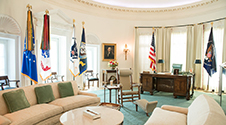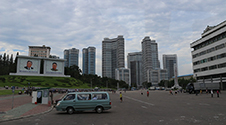North Korea’s Nuclear Issue at a Stalemate
North Korea’s nuclear problem, which is at a stalemate, will persist without a breakthrough in this year. With the November presidential election catching up to speed, debates have intensified in the United States (U.S.) over various domestic and economic issues, consequently diminishing interest in North Korea’s nuclear problem in the process. In addition, the governments of the Republic of Korea (ROK or South Korea), China, and Japan are currently occupied with addressing the novel coronavirus (COVID-19) outbreak, allocating their policy resources towards relieving the pandemic. Under these circumstances, it is unlikely for the Trump administration to seek for a denuclearization agreement with North Korea in the near term. Instead, President Trump will focus on proposing foreign policy initiatives that will help him secure more votes leading up to the election.
Since the beginning of the Democratic primary, many have been keen on assessing the proposed foreign policy views of the Democratic candidates. Although domestic and economic issues still lie at the core, diplomatic issues are increasingly gaining attention. As a result, the Democratic candidates’ views on North Korea are likely to emerge as crucial points of future discussions. So far, the candidates’ policy proposals regarding North Korea’s nuclear problem do not deviate much from the U.S. measures that have been tried over the past years. In addition to criticizing President Trump’s North Korea policy as a vanity project for the U.S. domestic politics, the Democratic candidates, despite their differences, seem to agree that future dialogues and step-by-step negotiations under certain conditions are necessary for reducing the North Korean threat. They have also been careful about mentioning the concept of CVID which will entail the possibility of imposing stronger sanctions and military pressure on North Korea since doing so may provoke security concerns among the U.S. public. To accommodate the recent tides of his rising popularity, Senator Bernie Sanders stated that he would be willing to meet Kim Jong-un to resolve the North Korea problem. Although Senator Sanders stands largely against the expansionary foreign policy of the U.S., such statement ironically does not seem much different from the Trump administration’s overall policy direction. In the end, Washington’s North Korea policy will have to undergo several revisions with the change of administrations and be newly defined in tandem with larger discussions on other issues faced by the U.S. Likewise, North Korea—having declared a long-term “head-on breakthrough” against the two major challenges of (1) economic crisis and (2) obstacles imposed by the external environment—will take the year to carefully plan its next steps in preparation for the inauguration of a new administration in the U.S.
U.S. Presidential Election and the Dispute over its Grand Strategy
North Korea’s nuclear issue and the future of the Korean Peninsula are closely linked to changes in the U.S. grand strategy. Although North Korea is an impending issue for the U.S. and its foreign affairs, Washington’s North Korea policy will be inevitably redefined depending on its wider international and public strategies. It is no longer to be taken granted to find strong momentum in the U.S.-ROK alliance on the basis of shared military threats emanating from North Korea and common values such as regional and global human security. Rather, alliance cost-sharing becomes a hot issue between the two allies on faulty grounds that South Korea has been free-riding on the U.S. Some U.S. strategists have attempted to redefine the alliance as part of the U.S. military deterrence mechanism against China. U.S.-ROK relations and the purposes of the overall bilateral alliances are being newly perceived as a result of the Trump administration’s self-centered economic standpoint and security concerns vis-a-vis China. Instead of looking to resolve the North Korea problem in cooperation with China, the U.S. is increasingly leaning towards analyzing the issue with the geostrategic lens of U.S.-China competition. This trend is likely to continue and is unlikely to be reversed.
It is difficult to tell whether the U.S. will be able to reconstruct the liberal international order and restore its leadership through allied cooperation against global problems. Democratic supporters criticize the Trump administration for demolishing U.S.-led international norms, undermining the liberal order, and for losing the trust of its allies and global leadership. Trump supporters, on the other hand, argue that although the Trump administration may have undertaken unconventional methods, its diplomatic strategy is rational; by gradually retrenching from regions that lack vital interests, the U.S. has been able to narrow down its expansive foreign policy to focus on the essentials. Globalists who comprise a supporting faction of the Democratic Party also argue that the U.S. public engagement strategy towards China has been successful and that China should continue to play the role of an appropriate and responsible stakeholder. However, it is also true that there has been a quick surge in opinions throughout Trump’s presidency in favor of holding U.S.-China disputes in the technology, politics, energy, socio-cultural and military sectors in check.
Public opinion surveys on the future diplomatic strategy of the U.S. provide some key implications going forward. According to polls conducted by the Pew Research Center on December 17, 2019, approximately seven out of ten Americans (73 percent) answered “good diplomacy is the best way to ensure peace,” while 26 percent of the Americans replied, “military strength will best achieve this.” There were more individuals who responded that the U.S. should consider the interests of its allies even if it means making compromises, in comparison with those who thought Washington should follow its own interests even when its allies strongly disagree (68 percent to 31 percent). These tendencies also differed depending on the respondents’ supporting party preference. The majority of Democrats and Democratic-learning independents, identified good diplomacy as the best way to ensure peace (90 percent), and added that even in case of a compromise the U.S. should consider the interests of its allies (83 percent). In comparison, only around half (53 percent) of Republicans and Republican learners saw good diplomatic relations as the best means of ensuring peace, while the remaining 46 percent contended that military strength precedes good diplomacy.
The U.S. public, however, provides a more cautious response to questions regarding U.S. foreign intervention. While 53 percent of all respondents answered that “it is best for the future of [the U.S.] to be active in world affairs,” 46 percent still responded, “[the U.S.] should pay less attention to problems overseas and concentrate more on problems here at home.” Furthermore, in terms of U.S. military power and status, 61 percent believed that the U.S. should aim to rise as the only military superpower while a mere 36 percent responded that it would be acceptable for other countries to become as militarily powerful as the U.S.
The generational gap is also an important variable in determining the future of the U.S. diplomatic strategy. Around a quarter (27 percent) of respondents aged sixty-five or older said they would be accepting of another country that grows as militarily powerful as the U.S., while nearly half (48 percent) of individuals under thirty responded positively to the same question. Such difference between the age groups is also confirmed by the variance in the U.S. public’s negative perception of China. According to a Pew Research Center survey from August 31, 2019, around half (49%) of the respondents aged eighteen to twenty-nine, 58 percent aged thirty to forty-nine, and two-thirds (67 percent) aged over fifty carried a negative perception of China. As portrayed by these results, future generations of the U.S. are showing increasing reservations about the hegemonic role of the U.S. and indicating tolerance towards the rise of its hegemonic rival, China.
North Korea’s Nuclear Issue and the Future U.S.-ROK Relations
The U.S. response to the North Korean nuclear issue has been based on several important considerations up until now. Washington has made it clear that it imposed sanctions on North Korea for the violation of international norms and principles based on nonproliferation, prevented the proliferation of its nuclear materials, weapons and related technology, and supported the security of its South Korean ally. In supporting South Korea, the U.S. has aimed to establish common grounds with China as a responsible great power emphasizing the shared goals of nuclear nonproliferation and its influence on North Korea as an ally
Future U.S. approach to North Korea’s nuclear issue will likely be shaped by its changing trend in grand strategy which emphasizes its own national interests and geopolitical calculation. Rapid transformations in grand strategy leads to rather sudden changes in the U.S. North Korea nuclear policy. Among many powers whose direct interests are related to the future of North Korea, the U.S. has been showing the most substantial degree of policy fluctuations recently. In fact, North Korea has been consistently insisting on guarantees of regime security, consequent nuclear disarmament and phased denuclearization. While the “Three Principles of Non-Nuclearization of the Korean Peninsula” are largely abstract, China’s policies towards the Korean Peninsula have also remained consistent over the years. South Korea’s approach has varied depending on whether it is headed by a liberal or a conservative administration, but regardless, it continues to pursue parallel development of both a peace process and a complete denuclearization on the Korean Peninsula. In comparison, as a global hegemonic power with comprehensive and diverse strategic interests related to international security, the rise of China, and Asia’s regional architecture, the U.S. tends to rearrange and adjust its priorities and strategies in dealing with North Korea. These uncertainties, which have risen especially after the Trump administration, will likely continue throughout the next administrations.
What have changed from the two summits between President Trump and Kim Jong-un is North Korea’s emergence as a normal actor in the international society, and the regime has been granted a certain degree of justification for its development of nuclear weapons. North Korea continues to argue that it has been forced to develop nuclear weapons because of the hostile policy of the U.S. Subsequently, Pyongyang demands that economic sanctions be lifted and joint military exercises between South Korea and the U.S. be halted if the regime is to give up its nuclear weapons. This line of argument of North Korea, which represents a significant departure from the internationally agreed perception that economic sanctions and military deterrence are necessary to enforce nonproliferation norms, has now been introduced to broad international community. President Trump and other Democratic presidential candidates after these changes, now seriously thinks that a step by step approach- for example, North Korea’s freezing of nuclear activity rewarded by lifting economic sanction-may be realistic.
It is unclear how these changes in U.S. policy will affect South Korea’s national interests. For South Korea, the North Korean nuclear issue poses challenges because it has been continuously reshaped and redefined by geopolitical circumstances and domestic politics of surrounding nations. As such, the changes in Washington’s approach towards North Korea are closely related to the fluctuations in its grand strategy and domestic situation. The upcoming presidential election will provide an opportunity for the U.S. to reassess and redefine Trump administration’s North Korea policy.
South Korea should approach the North Korean issue with a carefully devised foreign policy strategy based on perceived changes in the U.S. hegemonic strategy and great power politics between the U.S. and China. Until now, South Korea’s policy towards North Korea was predicated on the continuing U.S. hegemonic role, and East Asian politics defined by the combination of cooperation and limited rivalry between the U.S. and China. From here onwards, South Korea’s strategic tilt between the U.S. and China will draw sharp attention when it decides its North Korea policy, and South Korea’s strategy will affect neighboring countries’ calculation in dealing with North Korean nuclear issue. As the great powers’ geostrategic concerns gradually overshadows the future of North Korean nuclear matter, South Korea needs to accumulate more policy means and leverages to act as a decisive actor. These policy means must be developed by maintaining close and balanced strategic relations with neighboring countries.■
"IMG_3855" by Shafquat Towheed is licensed under CC BY-SA 2.0


■ Chaesung Chun received his PhD in international relations at Northwestern University in the United States, and serves on the policy advisory committee to the South Korean Ministry of Foreign Affairs and Ministry of Unification. His main research interests include international political theory, the ROK-US alliance, and Korean Peninsular affairs. He is the co-author of The Korean War: Threat and Peace, and the author of a number of publications including Are Politics Moral and International Politics in East Asia: History and Theory.





